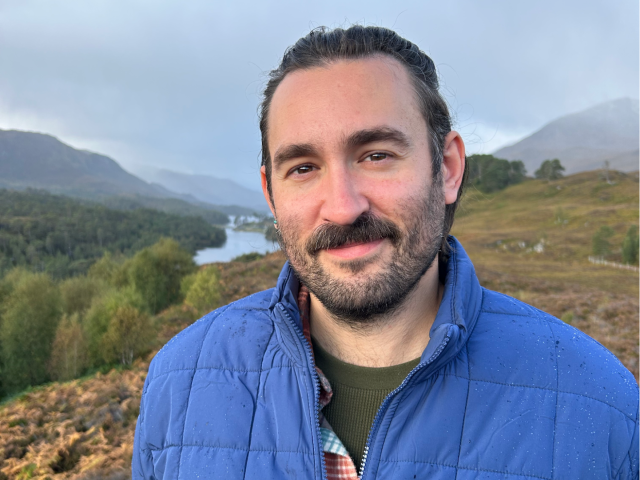Meet CCS Marine Science Faculty Max Czapanskiy
From Software Engineering to Marine Science: Max Czapanskiy’s Unique Pathway to CCS

CCS Marine Science Faculty Max Czapanskiy joins the College of Creative Studies (CCS) with expertise in data science for marine ecology. Now, he shares his fascinating and unconventional path to bringing his marine science expertise to CCS, blending his early career in software engineering with an unexpected passion for nature and a love for teaching— sparked by a fateful encounter with seabirds. By sharing his journey, Max hopes to inspire students to embrace adaptability and stay true to their own unique journeys.
CCS: Can you share a little about your background?
Max Czapanskiy (MC): I became a marine biologist by accident. My career started in software engineering, but then I got really into bird watching and decided to bail on tech and become an ecologist. It just so happened my first field experience was with seabirds in the Arctic, and I fell in love with polar marine ecosystems. Since then, I’ve used my computational skills to tackle questions in spatial ecology, movement ecology, and ecophysiology. It was during my PhD that I really fell in love with teaching, specifically data science. There are so many brilliant early-career scientists (many of them students) who don’t get enough training to use and publish large, complex datasets, and it can be a real source of frustration. I find a great deal of fulfillment in helping other scientists gain the skills they need to pursue their research interests.
“It just so happened my first field experience was with seabirds in the Arctic, and I fell in love with polar marine ecosystems. Since then, I’ve used my computational skills to tackle questions in spatial ecology, movement ecology, and ecophysiology.”
—CCS Marine Science Faculty Max Czapanskiy
MC: I did my undergrad degree in the basement of an engineering building in NYC, so I didn’t have a lot of connection to nature. But after college I moved to Seattle and started spending a lot of time outside exploring the Pacific Northwest. In the summer of 2011, I took a naturalist course for fun and happened to see a Western Tanager flitting through the upper branches of a pine forest in the eastern Cascades. It was one of the most beautiful things I’ve ever seen. I knew there and then that software engineering was the wrong career for me, and I started looking for opportunities in ecology. The great irony, of course, is that I now spend almost as much time coding as I did when I was a software engineer! So my career has come full circle, but I find coding to understand connections in nature far more exciting than anything I did as an engineer.
CCS: What do you find most compelling about CCS?
MC: I’m so excited by the emphasis on undergraduate research. I was a senior in college before I knew research was an option for undergrads. Maybe my career would have gone in an entirely different direction if I had learned that sooner! I can’t wait to work with CCS first-years and help them figure out how to get involved in research, make meaningful contributions, and decide if research is their ultimate goal. Whether students pursue research long-term, or decide they want to go in a different direction, I’m looking forward to supporting them on their academic journey.
“I can’t wait to work with CCS first-years and help them figure out how to get involved in research, make meaningful contributions, and decide if research is their ultimate goal.”
—CCS Marine Science Faculty Max Czapanskiy
CCS: What are you most looking forward to in the Marine Science major and within the broader CCS community?
MC: Here’s the thing about people: we’re terrestrial animals. So much about the marine environment is totally counterintuitive to how we perceive and understand the world. To take one example, light and vision are excellent ways to perceive the terrestrial world, but sound and hearing work way better in the ocean. This simple difference has massive implications for how marine animals evolve and interact with their environment, and we’re only beginning to learn how to “see” the underwater world the way they do. I’m really looking forward to working with our marine science students to take a step back and rethink their basic assumptions about how the world works, because it’s a whole different set of rules down there.
CCS: Outside of your academic work, what are your interests or hobbies?
MC: I love baking bread. My specialties are bagels and challah, but I also make a mean cinnamon star (a pointy cinnamon roll big enough for six people). These days I’m trying to expand my repertoire of gluten-free breads. Some day I’ll bake the perfect gluten-free bagel, but my experiments so far have been disastrous!
CCS: Is there anything else you'd like to share with the CCS community?
MC: Everyone’s path through school looks different, and that’s ok! I had a lot of trouble in school my senior year of college and it took me nine years before to finish my bachelor’s degree. I used to be so embarrassed about that, but I think it’s important to share. At UCSB and in CCS, you’re going to be surrounded by students, staff, and faculty that have achieved a huge amount of success. You won’t always see the missteps and failures they experienced along the way. It’s totally normal to feel some impostor syndrome in an environment like this, but just remember your path is your own and that’s ok.
“It’s totally normal to feel some impostor syndrome in an environment like this, but just remember your path is your own and that’s ok.”
—CCS Marine Science Faculty Max Czapanskiy
The College welcomes Max and and we look forward to the exciting impact he will have on our students and the Marine Science program.